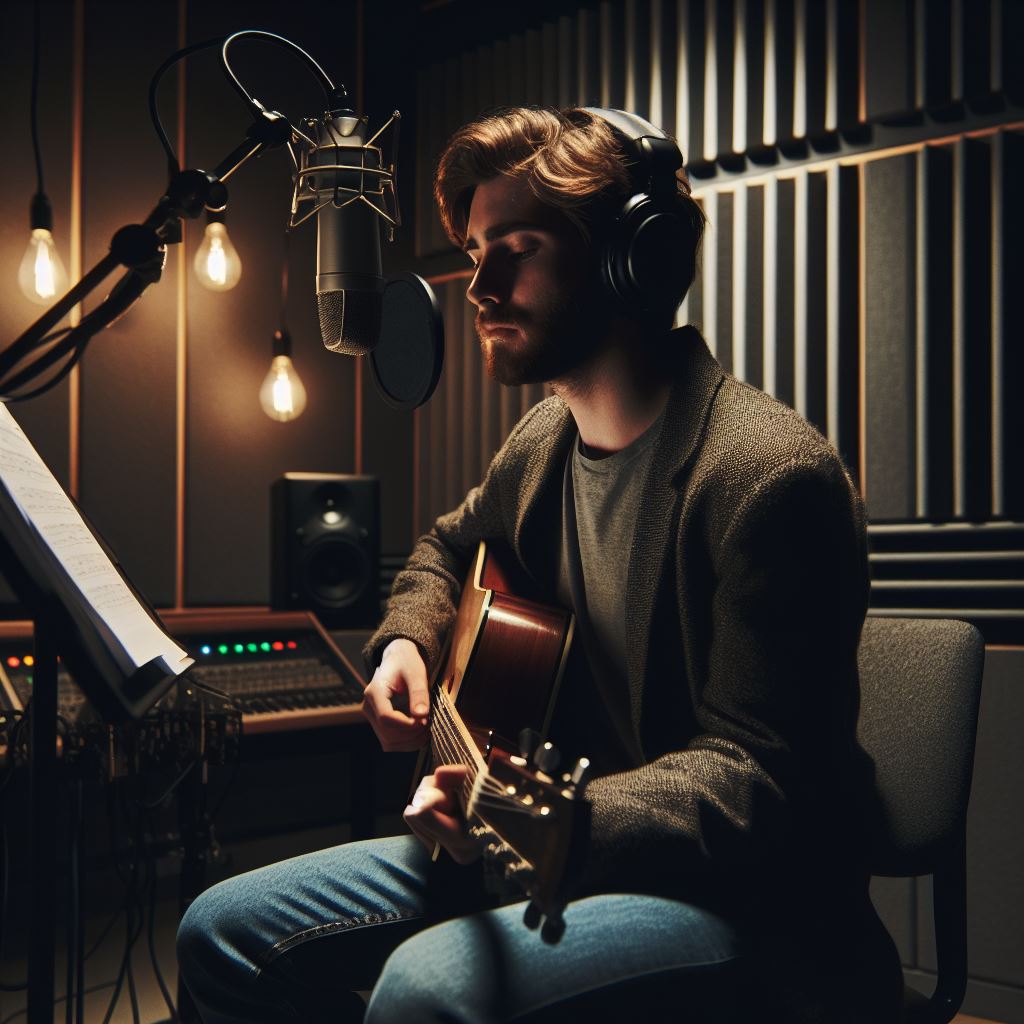Introduction
Welcome to the dynamic world of the UK music scene, a vibrant tapestry of genres and talent.
In this bustling industry, getting noticed is your ticket to success.
Aspiring musicians, listen up!
The UK music scene is a melting pot of creativity, from the rich history of rock and pop to the pulsating beats of electronic and grime.
It’s a competitive arena where standing out is crucial.
Why is getting noticed so pivotal? In this cutthroat industry, visibility can make or break a career.
Success hinges on capturing the attention of producers, labels, and fans.
This blog is your guide to navigating this exciting but challenging landscape.
Our purpose is clear—to equip you, the aspiring musician, with the knowledge and tools needed to rise above the noise.
The journey may be tough, but the rewards are worth it.
It’s about more than just making music; it’s about making an impact.
So, buckle up for a thrilling ride through the strategies and tactics that can elevate your presence in the UK music scene.
From mastering social media to networking at events, we’ll cover it all.
The stage is set, and your time to shine is now.
Get ready to make your mark in the heart of the UK’s pulsating music culture!
Personalized UK Career Consulting
Receive tailored career guidance designed just for you. Get actionable steps and expert support to boost your career in 1-3 days. Take control of your career now.
Get StartedUnderstanding the UK Music Scene
The thriving music industry in the UK
- The UK music industry is a vibrant and dynamic ecosystem that continues to evolve and thrive.
- It is one of the largest and most influential music industries in the world, with a rich history and diverse talent pool.
- There are numerous record labels, music publishers, and live music venues that contribute to the industry’s success.
- From iconic bands like The Beatles and Queen to contemporary artists like Adele and Ed Sheeran, the UK has produced some of the biggest names in music.
- The industry provides employment opportunities for a wide range of professionals, including musicians, songwriters, producers, and audio engineers.
Variety of genres and styles present in the scene
- The UK music scene is known for its diverse range of genres and styles, catering to various tastes and preferences.
- From rock and pop to electronic and hip-hop, there is something for everyone.
- Alternative and indie music also thrive in the UK, with bands like Arctic Monkeys and Radiohead gaining international recognition.
- The scene embraces cultural diversity, with genres like reggae, jazz, and world music making significant contributions.
- Additionally, subcultures like punk, grime, and Britpop have played a vital role in shaping the UK music scene.
The competitiveness and challenges faced by aspiring musicians
- While the UK music scene offers numerous opportunities, it is also highly competitive.
- Aspiring musicians often struggle to get noticed in a saturated market, making it crucial to stand out.
- Establishing a unique sound and image, building a solid fan base, and networking are vital for success.
- Financial challenges, such as funding recordings and promoting music, can also hinder aspiring musicians.
- The rise of digital platforms has revolutionized the industry, but it has also increased the competition for online visibility and streaming numbers.
- Touring and performing live are essential to gain exposure, but it can be challenging for emerging artists to secure gigs and build a fan base.
Generally, the UK music scene is a thriving industry with a rich history, diverse genres, and significant challenges.
Aspiring musicians must navigate the competitiveness by establishing a unique presence, building connections, and overcoming financial barriers.
However, with perseverance and talent, the UK music scene continues to provide opportunities for artists to get noticed and make their mark on the global stage.
Read: Earning as a Musician in the UK Today
Building an Authentic and Engaging Brand
Importance of creating a unique personal brand
- Develop a personal brand that sets you apart from other musicians.
- Your brand should reflect your style, values, and unique personality.
- A strong personal brand helps you stand out in the competitive UK music scene.
- Take time to define your brand persona and ensure consistency in all your interactions.
- Invest in professional branding materials such as logos, fonts, and color schemes.
The need to understand and connect with a target audience
- Identify your target audience – who are the people you want to listen to your music?
- Conduct market research to understand their preferences, interests, and demographics.
- Tailor your music and marketing efforts to resonate with your target audience.
- Engage with your audience through social media, email newsletters, and live performances.
- Building a genuine connection with your fans creates a loyal following and word-of-mouth promotion.
Tips on developing a strong online presence through social media and websites
- Utilize social media platforms like Facebook, Instagram, and Twitter to showcase your music and engage with fans.
- Regularly post updates, behind-the-scenes content, and interact with your followers.
- Create a professional website with a biography, music samples, upcoming events, and contact information.
- Optimize your online presence for search engines by using relevant keywords in your content.
- Collaborate with influencers or bloggers to further expand your online reach and gain exposure.
Express your individuality and creativity
- Be true to who you are as an artist by embracing your individuality.
- Experiment with different musical styles, genres, and visual aesthetics to find your unique voice.
- Allow your creativity to shine through in your songwriting, performances, and overall brand.
- Create a memorable experience for your audience through visually appealing album art and stage designs.
- Showcase your authenticity in everything you do, as this will attract attention and build a loyal fan base.
Essentially, building an authentic and engaging brand is crucial for aspiring musicians in the UK music scene.
By creating a unique personal brand, understanding and connecting with a target audience, developing a strong online presence, and expressing individuality and creativity, musicians can increase their chances of getting noticed and building a successful career in the industry.
Remember, the music scene is highly competitive, so it is essential to stand out from the crowd and leave a lasting impression on your audience.
Read: Balancing Gigs & Life: UK Musicians’ Tips
Collaborating and Networking
Significance of building relationships in the industry
Building relationships in the music industry is crucial for gaining recognition and success.
To increase exposure and opportunities, musicians should actively network with other artists, producers, and industry professionals.
Attending music events, conferences, and open mic nights provides a platform to meet new connections.
Network with other artists, producers, and industry professionals
Collaborating with other talented musicians not only enhances creativity but also helps in promoting each other’s work.
Working with different artists exposes you to new styles, sounds, and audiences, expanding your reach.
Collaborative projects allow for sharing fans and followers, giving everyone involved a wider audience.
Your Dream Job Starts with a Perfect CV
Get a tailored CV and cover letter that captures your unique strengths and stands out in your industry. Let us help you make an unforgettable first impression.
Get StartedDeveloping relationships with established artists can lead to mentorship opportunities and guidance in navigating the industry.
Producers play a critical role in shaping your music, so building a connection with them can open doors to better production quality.
Networking with industry professionals, such as managers or A&R representatives, can lead to record deals and promotional support.
Utilize online platforms, such as social media and music streaming services, to connect with like-minded artists from all over the world.
Consider reaching out to artists in similar genres or those whose music complements your style.
Collaborating with artists from different backgrounds and genres can bring a fresh perspective to your music.
Attend music events, conferences, and open mic nights to meet new connections
Attend local music industry events to meet musicians in your area and establish connections within your community.
Research conferences and workshops related to the music industry and make an effort to attend them.
These events provide valuable learning opportunities and opportunities to meet industry professionals.
Open mic nights offer a chance to showcase your skills and meet fellow musicians or potential collaborators.
Invest time and effort in building meaningful relationships rather than focusing solely on self-promotion.
Show genuine interest and support for other artists’ work, and they will likely reciprocate.
Don’t be afraid to reach out to others and propose collaborative projects or performances.
Collaborations can help you tap into new fan bases, as each artist brings their own followers and supporters.
Optimize Your LinkedIn for Success
Boost your LinkedIn profile with a professional bio, keyword-rich headline, and strategic recommendations that attract recruiters. Stand out from the crowd and get noticed.
Optimize NowCombine different talents and skills to create a unique and memorable musical experience.
Benefits of collaborating with other musicians for exposure and growth
Through collaboration, you can learn from others, gain new perspectives, and further develop your musical style.
Remember that networking and collaboration go hand in hand in the music industry.
By actively participating in both, you can expand your reach, gain exposure, and grow as an artist.
Building relationships takes time and effort, but the benefits can be life-changing for your music career.
Stay open-minded, be proactive, and seize every opportunity to connect with others in the industry.
As the saying goes, “It’s not just what you know, but who you know” – and this rings true in the UK music scene.
Read: The UK Musician’s Guide to Copyright Laws

Creating and Sharing High-Quality Content
The Importance of Producing Original and Professional-Quality Music
- Originality is crucial in capturing the attention of listeners in the highly competitive UK music scene.
- High-quality production showcases professionalism and enhances the overall listening experience for audiences.
- Creating unique and memorable music strengthens an artist’s brand and distinguishes them from the competition.
Tips on Recording, Producing, and Mastering Music
- Invest in quality recording equipment and software to ensure clear and polished sound.
- Work on perfecting the technical aspects of music production, such as mixing and mastering, to achieve professional-grade results.
- Collaborate with experienced producers or engineers to enhance the overall production value of the music.
Utilizing Streaming Platforms, Music Videos, and Live Performances
- Music streaming platforms like Spotify, Apple Music, and SoundCloud provide accessible channels for reaching a wider audience.
- Creating engaging music videos can attract new fans and increase visibility on platforms like YouTube and social media.
- Live performances, whether online or offline, allow artists to connect with fans, build a loyal following, and gain exposure.
Engagement Strategies for Actively Promoting Music Online
- Utilize social media platforms to establish a strong online presence and engage with followers.
- Regularly release new content, such as singles, EPs, or albums, to maintain momentum and keep fans interested.
- Collaborate with other artists or influencers to tap into their fan base and cross-promote each other’s music.
- Engage with fans through live Q&A sessions, exclusive content, or behind-the-scenes glimpses to foster a sense of community.
- Seek out music blogs, online radio stations, and podcasts to feature your music and expand your reach.
- Encourage fans to share your music with their networks and provide incentives for referrals, such as exclusive content or merchandise.
- Stay active and responsive on music forums and online communities to connect with potential fans and industry professionals.
- Monitor and analyze online metrics, such as streaming numbers, social media engagement, and website traffic, to track progress and adjust strategies accordingly.
In general, creating and sharing high-quality content plays a vital role in getting noticed in the UK music scene.
Producing original and professional-quality music showcases talent and helps build a unique brand.
Recording, producing, and mastering music require technical expertise and collaboration.
Utilizing streaming platforms, music videos, and live performances expands reach.
Engaging with fans and utilizing online promotion strategies actively promotes music and builds a loyal fan base.
Read: Health & Wellness Tips for UK Musicians
Utilizing Music Platforms and Services
Achieving success and getting noticed in the highly competitive UK music scene requires artists to strategically utilize various platforms and services available in the industry.
This section explores the different platforms for sharing and distributing music, the benefits of streaming services, and the opportunities that music licensing platforms present for sync placements and royalties.
Sharing and Distributing Music
- SoundCloud: SoundCloud is a popular platform for independent artists to share their music and gain exposure. It allows users to upload and stream original tracks.
- YouTube: YouTube is not only a video-sharing platform but also a prominent music-sharing platform where artists can upload their music videos and gain a global audience.
- Bandcamp: Bandcamp provides a platform for artists to sell their music directly to fans, offering a variety of formats and customization options.
- Mixcloud: Mixcloud specializes in hosting DJ mixes, radio shows, and podcasts, offering opportunities for DJs and radio hosts to showcase their talent.
- SoundClick: SoundClick is a social music platform that allows artists to upload and sell their music while connecting with fans through forums and profiles.
Benefits of Streaming Services
- Spotify: Spotify is one of the largest streaming platforms globally, with a vast user base. Artists can reach millions of potential listeners and gain exposure through curated playlists.
- Apple Music: Apple Music provides artists with a platform to promote their music to a huge user base, featuring customizable artist profiles and curated playlists.
- Tidal: Tidal is known for its high-quality audio streaming and exclusive content, making it an attractive platform for artists looking to target a premium audience.
- Deezer: Deezer offers personalized recommendations and playlists, allowing artists to reach listeners who have shown an interest in similar genres or artists.
- Amazon Music: Amazon Music provides artists with the opportunity to tap into the vast user base of Amazon Prime subscribers and reach a diverse audience.
Music Licensing Platforms
- SyncPlacements: SyncPlacements is a platform that connects artists with opportunities for their music to be used in film, TV, commercials, video games, and other media.
- Music Gateway: Music Gateway offers a range of services, including licensing opportunities, song pitching, and collaboration with other artists, producers, and industry professionals.
- Songtradr: Songtradr is a global licensing platform that enables artists to monetize their music through sync placements, royalties, and licensing opportunities.
- Pond5: Pond5 is a marketplace for artists to license their music for use in videos, commercials, films, and other visual media, providing a platform for exposure and income.
- Artlist: Artlist is a subscription-based music licensing platform that offers a wide variety of high-quality music tracks for filmmakers, YouTubers, and other content creators.
By utilizing these platforms and services, artists in the UK music scene can expand their reach, connect with their audience, and increase their chances of getting noticed by industry professionals.
Whether it’s through sharing music on SoundCloud, streaming on Spotify, or licensing their music for sync placements, these platforms provide valuable opportunities for artists to showcase their talent and make a mark in the industry.
Seeking Opportunities and Exposure
Search for local gigs, festivals, and opportunities to perform
- Local gigs and festivals provide valuable opportunities for musicians to showcase their talent.
- Performing live allows musicians to connect with their audience on a more personal level.
- Networking with other musicians and industry professionals is easier when participating in local events.
- Regularly attending local gigs and festivals can help musicians become familiar faces in the music scene.
- Building a local fan base is crucial for gaining recognition and support in the wider music industry.
- It is important to research and find suitable gigs and festivals that align with the musician’s genre and target audience.
- Contacting event organizers and submitting applications in a professional manner increases the chances of being selected.
Benefits of entering competitions, talent shows, and submitting music to radio stations
- Competitions and talent shows provide a platform for musicians to showcase their skills to a wider audience.
- Winning or being recognized in these competitions can open doors to further opportunities and exposure.
- Radio stations play a crucial role in promoting and discovering new talent.
- Submitting music to radio stations increases the chances of being played, expanding the audience reach.
- Online platforms and streaming services sometimes discover new talent through radio airplay.
- Local radio shows that focus on promoting independent artists are an excellent starting point for exposure.
- Being heard on the radio can generate interest from industry professionals, leading to potential collaborations or record deals.
Approaching music bloggers, influencers, and local media for press coverage
- Music bloggers and influencers have a significant influence on music discovery in today’s digital age.
- Research and identify relevant music bloggers and influencers that align with the musician’s style and genre.
- Building relationships with these bloggers can lead to positive reviews, features, and interviews.
- Sharing their music through influential platforms increases the chances of reaching a larger audience.
- Utilizing social media to connect with bloggers and influencers can be a convenient way to establish contact.
- Local media outlets, such as newspapers and magazines, often have sections dedicated to music.
- Submitting press releases, music samples, or reaching out directly to local media can result in press coverage and interviews.
In essence, seeking opportunities and exposure is crucial for musicians in the UK music scene.
Encouraging them to actively search for local gigs, festivals, and other performance opportunities helps build connections and gain recognition.
Additionally, participating in competitions, talent shows, and submitting music to radio stations increases the chances of getting noticed.
Lastly, approaching music bloggers, influencers, and local media for press coverage can significantly expand their reach and impact in the industry.
Ultimately, a proactive approach towards seeking opportunities and exposure is essential for success in the UK music scene.
Persistence, Resilience, and Adaptability
Importance of perseverance and not giving up
- Don’t underestimate the power of persistence in the UK music scene.
- Many successful musicians have faced numerous rejections before achieving their breakthrough.
- It’s crucial to keep pushing forward, even when faced with setbacks or disappointments.
- Believe in your talent and never give up on your dreams of being noticed.
- Remember that each rejection brings you one step closer to success.
The need to learn from failures and setbacks
- Failures and setbacks are inevitable in the journey of getting noticed in the UK music scene.
- Instead of dwelling on these failures, use them as valuable learning experiences.
- Analyze what went wrong, identify areas for improvement, and make necessary adjustments.
- View setbacks as opportunities to grow and develop as a musician.
- Embrace constructive criticism and use it to refine your skills and performance.
Adapt to changes in the industry and embrace new opportunities
- The UK music scene is constantly evolving, with new trends and technologies shaping the industry.
- Musicians need to adapt to these changes and embrace innovative approaches.
- Stay updated with emerging platforms and use them to showcase your talent.
- Explore collaborations with other musicians and genres to expand your reach and audience.
- Be open-minded to new opportunities, such as licensing deals, sync placements, or online concerts.
- Expand your musical skills and knowledge to stay relevant and competitive in the UK music scene.
- Embrace the shift towards digital platforms and utilize social media to connect with fans.
In the competitive UK music scene, persistence, resilience, and adaptability are paramount.
Don’t let rejections deter you, but rather fuel your determination.
Learn from failures, adjust your approach, and constantly improve your craft.
Stay flexible and embrace new opportunities that arise in the ever-changing music industry.
By embodying these qualities, you increase your chances of getting noticed and achieving success in the UK music scene.
Conclusion
Navigating the UK music scene demands strategy.
Craft a compelling narrative through active networking and persistent self-promotion.
Leverage social media’s power to showcase your talent, maintaining a consistent online presence.
Encourage others with your unique sound.
Seek collaboration, attend local events, and build genuine connections within the industry.
Every gig, no matter how small, is an opportunity to shine.
Embrace constructive criticism as a stepping stone to improvement.
Stay proactive in seeking performance opportunities and submitting your work to various platforms.
The key is persistence; breakthroughs often come when least expected.
Remember, success in the music industry is a marathon, not a sprint.
In your journey, keep refining your brand.
Consistency in image and message is crucial. Cultivate a strong online identity that resonates with your target audience.
Embrace versatility, adapt to trends, and don’t shy away from showcasing your personality.
To truly stand out, be a trailblazer.
Embrace the uniqueness that sets you apart. Harness your passion, let it fuel your dedication.
The UK music scene is vast, and your journey is a continuous evolution. Be bold, be relentless, and let your music echo beyond boundaries.
In a nutshell, getting noticed in the UK music scene requires a combination of talent, strategy, and unwavering determination.
As you embark on this exhilarating journey, remember that every note played and every connection made is a significant stride toward recognition and success.
[E-Book for Sale]
500 Cutting-Edge Tech Startup Ideas for 2024 & 2025: Innovate, Create, Dominate
$19.99 • 500 Tech Startup Ideas • 62 pages
You will get inspired with 500 innovative tech startup ideas for 2024 and 2025, complete with concise descriptions to help you kickstart your entrepreneurial journey in AI, Blockchain, IoT, Fintech, and AR/VR.




